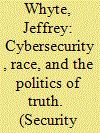| Srl | Item |
| 1 |
ID:
187117


|
|
|
|
|
| Summary/Abstract |
This article explores the racial politics underwriting cybersecurity’s recent human turn toward the issues of online disinformation and ‘foreign influence’ in US politics. Through a case study of the Black Lives Matter (BLM) movement, this article’s first half considers how contemporary cybersecurity has produced ‘racial division’ as an object of security by framing the BLM movement as a geopolitical vulnerability open to foreign manipulation through social media. In its emphasis on the political protest as a site of insecurity, I argue that contemporary cybersecurity has widened its traditional spatiality ‘beyond the computer’. In the article’s second half, I argue that the racialization of cybersecurity has underwritten a politics of truth ultimately concerned less with parsing true from false, and more with defining the boundaries of secure political knowledge and communication. I argue that contemporary cybersecurity has produced an idealized subject for whom an obligation to possess contingent forms of knowledge becomes a condition of secure political subjectivity. I conclude with a critique of contemporary cybersecurity’s tendency to portray dissident political movements like BLM as ignorant or disinformed.
|
|
|
|
|
|
|
|
|
|
|
|
|
|
|
|
| 2 |
ID:
162264


|
|
|
|
|
| Summary/Abstract |
The United States Information Agency (USIA) has received little sustained scrutiny from critical military geographers, despite the major role it played in waging the Cold War. This article outlines the USIA’s role in waging psychological war in support of the US mission in Vietnam, notably its establishment in 1965 of the Joint United States Public Affairs Office (JUSPAO). Through an analysis of USIA operations, this article argues that psychological war can be understood as a governmental strategy to exert power over the people and territory of Vietnam. Through an examination of problems related to evaluating and conducting research for psychological war, this article questions the extent to which the United States succeeded in establishing this power, concluding that the effects of psychological war in Vietnam were, at best, inconclusive, and offer little evidence to support contemporary strategies to ‘win hearts and minds’.
|
|
|
|
|
|
|
|
|
|
|
|
|
|
|
|